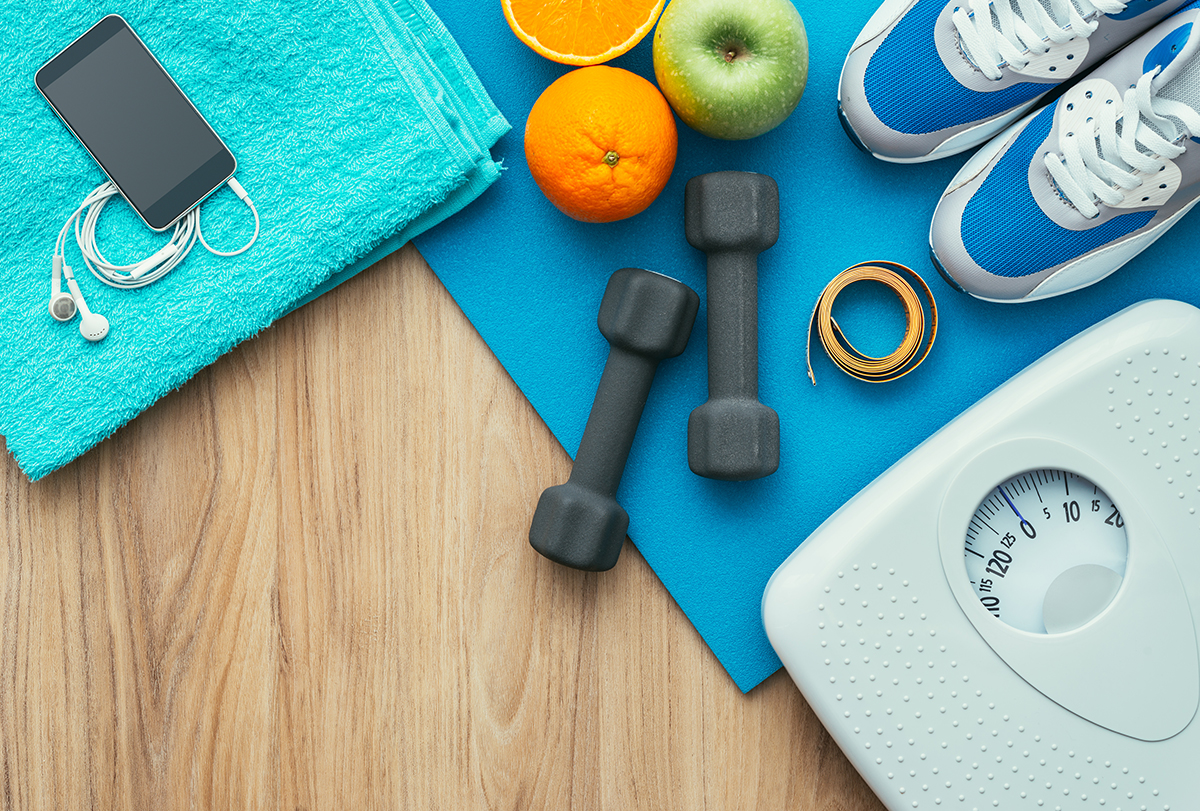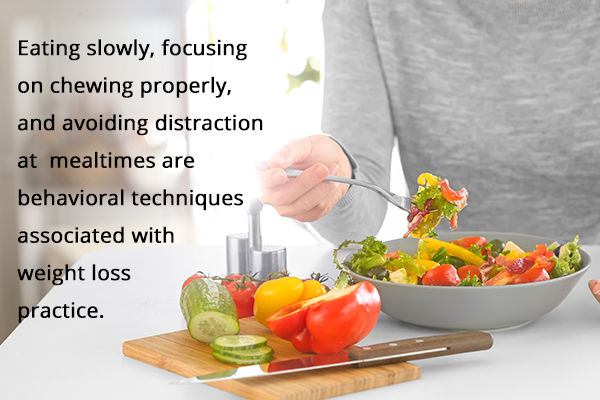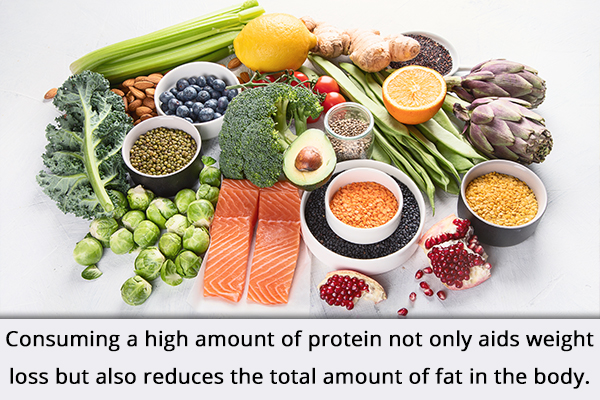In this article:
The Internet is filled with advice on how to lose weight, tips to follow, and tried-and-tested methods that worked for one person or another. While most of these tips are by and large true, they fail to take into account a few key aspects:

- Everyone’s body is unique.
- The reason for weight gain is different for everyone.
- Weight loss is also influenced by a person’s time and socioeconomic ease.
However, regardless of these differences, there are some proven techniques and changes you can incorporate into your routine to achieve weight loss and maintain a healthy weight.
Weight gain, at its crux, is a matter of balancing the energy you obtain through food and the energy you spend through physical activity or biological functions.
Due to changes, such as lack of physical activity, overeating, changes in metabolism, or some diseases, the body is unable to spend as many calories as it takes in, causing a person to retain the excess weight in the form of fat. (1)
Effective Tips for Weight Loss
Here are some of the weight loss tips you may have heard of before but this time are backed by science and research.
1. Do not skip meals
It can be very tempting to skip meals to restrict the calories you consume. However, skipping breakfast has been directly linked to an increase in weight gain and is a risk factor for obesity. (2)
A study done on university students found skipping dinner to be associated with a risk of weight gain. (3)
2. Eat slowly and mindfully

Eating slowly, focusing on chewing properly, and avoiding distractions at mealtimes are behavioral techniques associated with weight loss practice. (4)
In a study of 24 participants, the groups encouraged to eat slowly and mindfully were observed to consume lesser food as compared to the group asked only to eat. (4)
Mindful eating allows a person to pay more attention to their hunger and satiety cues, lowering their chances of overeating. (4)
3. Increase physical activity
One of the easiest and most effective ways to balance energy intake and expenditure is by doing some exercise.
Physical activity in the form of exercise not only helps in reducing weight but is also good for the heart as it helps in the prevention and reduction of the risks of many heart diseases. (5)
All you need to do is perform at least 150 minutes (2.5 hours) of moderate physical activity each week. (5) Simple activities such as taking the stairs instead of the elevator or walking up to 30 minutes each day can ensure good results.
4. Increase fiber in the diet
Fiber-rich foods promote satiety and bring about the feeling of fullness that will ultimately prevent overeating and weight gain. (6)
The POUNDS Lost (Preventing Overweight Using Novel Dietary Strategies) Study found that consumption of high-fiber foods promoted weight loss and adherence to other dietary interventions in adults who were overweight or obese and were consuming a calorie-restricted diet. (7)
Fruits and vegetables, whole grains, oats, pulses, and legumes are all high-fiber foods that can be included as part of a weight loss diet.
5. Include protein in each meal

Clinical studies have found consuming a high amount of protein not only aids weight loss but also reduces the total amount of fat in the body while also preserving muscle mass. High-protein diets not only aid weight loss but also prevent weight gain. (8)
Proteins work by reducing the hormones that increase appetite and bring about satiety, preventing overeating. (8)
The ideal protein intake per day for adults is 0.8-2.22 g/kg body weight depending on the amount of physical activity. Simply ensuring 1/4th of the plate at meal times of protein-rich food is enough to gain its weight loss benefits.
6. Make use of metabolism boosters
Whatever food that you consume has an impact on diet-induced thermogenesis (DIT), which is the process by which the body burns more calories. (9)
Recently, a lot of discussion surrounding the consumption of foods that can increase metabolism and DIT has been happening. Some foods have a direct impact on improving the energy expenditure of the body, and the inclusion of such foods in the diet can help bring about weight loss. (9)
Dark chocolate (at least 70% cocoa), green tea, chili, cinnamon, ginger, turmeric, and green coffee have been widely studied for their metabolism-boosting effects. (9)
7. Focus on hydration
Drinking less water throughout the day can result in a disbalance of the body’s hydration and electrolyte levels. By drinking enough water, the mitochondria of the cell – which is where most of the energy expenditure occurs – function properly, causing weight loss.
Appropriate hydration levels are also linked to a reduced risk of diabetes, heart diseases, and even Alzheimer’s disease. (10)
Drink up to 2 liters of water each day to stay well hydrated.
8. Avoid added sugars

Most packaged foods contain a high amount of added sugar that is contributing greatly to the growing pandemic of obesity.
When a high amount of sugar is consumed, the body breaks it down to glucose, and whatever is not used by the body is stored in fat cells in the form of fat. (11)
Therefore, avoidance of foods with high amounts of added sugar can aid in weight loss.
9. Practice portion control
It is often difficult to assess your eating pattern on a day-to-day basis. Ensuring all the necessary nutrients and food groups are covered throughout the day can be tiresome.
Most dietitians will recommend simple strategies to ensure you do not overeat and that whatever food you consume must contain all the necessary nutrients.
The MyPlate model developed in 2011 has become a handy tool in assessing portion control. It is a 2D depiction of a plate with recommended guidelines on how to build a plate that includes all the necessary food groups such as fruits, vegetables, grains, protein, and dairy. (12)
While it is unclear if portion control plates can directly cause weight loss, it, however, will ensure the addition of protein- and fiber-rich fruits and vegetables that are both linked to weight loss.
10. Get good sleep
Obesity and weight gain are often linked directly to what you eat and drink. However, sleep also plays an important role in helping you shed and keep off the excess weight.
In a study of 125 adults with obesity, better sleep health – measured through six parameters of sleep quality including regularity, alertness, timing, and duration – was associated with a greater fat loss. (13)
Precautions to Consider
It is imperative to note that all of the weight loss tips mentioned in this article are supposed to aid the general rule of any weight loss strategy, which is calorie restriction. To lose weight, more calories have to be spent than the calories consumed.
Another important thing to consider is that weight loss, like weight gain, happens over a period of time. Dedication and patience are key to a sustained weight loss plan.
What Can Help Me Lose Weight Quickly?

Any weight that is lost quickly is likely to be water weight. Please remember that for your weight loss to be sustainable and long term, you have to stay dedicated to a weight loss plan for some time.
Any fad diet that promises quick results will likely have you gaining all the weight back as soon as the diet ends.
Final Word
Obesity is one of the fastest-growing epidemics of the modern world. With the availability of fast foods, easy-to-consume meals, and packaged foods, it is very difficult to maintain a healthy eating pattern.
Whether it is due to due to diet, disease, medication, or lack of activity, weight gain is everyone’s concern. Making dietary and lifestyle changes is at the forefront of the fight against weight gain.
Behavioral changes such as good sleep, mindful eating, eating slowly, and chewing properly also play a role in helping the body shed and keep off the extra kilos.
- Was this article helpful?
- YES, THANKS!NOT REALLY


